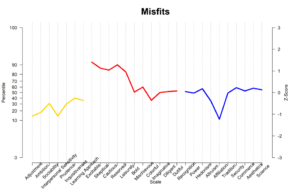Welcome back to our series on the eight most common personality types found in the Hogan suite of assessments. We have already taken an in-depth look at Rebels, Marketers, Proletarians, Congenials, Overachievers, and Networkers. This week, we continue our dive into these personality types with a close examination of the Misfits personality profile.
The personality profile of Misfits makes up approximately 7% of the working population. Their Hogan profile is highlighted by below average scores on Hedonism and very low scores on Affiliation on the MVPI; low scores across the board on the HPI with extremely low scores on Adjustment, Ambition, and Interpersonal Sensitivity; and very high scores on the “moving away” cluster (Excitable, Skeptical, Cautious, Reserved, and Leisurely) of HDS. See Figure 1 below for the full profile.
Figure 1: Misfits personality profile

The Reputation of the Personality Profile of Misfits
We had eight Hogan consultants with a combined 82 years of experience provide independent, written interpretations of the Misfits personality profile shown above. Some of the words our experts most frequently used to describe Misfits were “isolation,” “stressful,” “challenges,” “pressure,” “mistrusting,” “passionate,” and “emotional.” Additionally, we examined the workplace reputation of Misfits by drawing on Hogan 360 data gathered with Hogan distributor Peter Berry Consultancy.
Colleagues, supervisors, and subordinates said Misfits have the right knowledge and experience to be effective at work. At the same time, Misfits’ work colleagues also said that they bring a negative attitude to work, lack enthusiasm for customer service, and have poor people skills. In other words, Misfits often have the technical expertise and capacity to do their work well, but struggle with the social skills needed to truly excel in modern work environments.
Our job performance archive also provides insight regarding how Misfits are perceived by their supervisors: bosses see Misfits as having difficulties with conflict management, political savvy, professionalism, and relationship building. Likely due to their lack of social skills, the Misfits personality profile received the lowest overall performance ratings in our archive. To summarize, Misfits have the competence and capabilities on par or, in some cases, even better than their colleagues. However, their pessimistic and aloof interpersonal style creates difficulties in the workplace for their colleagues and supervisors.
Common Careers for Misfits
Misfits prefer careers where they can work in isolation and without much social interaction. They prefer jobs with little oversight where they can complete their tasks unmonitored. They also tend to be most successful in jobs with clear instructions for performance. Our data show the personality profile of Misfits are overrepresented in both the military and technician jobs.
They are also slightly over-represented among first-line supervisors, likely due to their technical skills, knowledge, and expertise in the job. We also find that the personality profile of Misfits is over-represented among samples of remote computer workers, which is a good fit for their asocial interpersonal style. In popular media, characters such as the Black Widow (Marvel), April Ludgate (Parks and Recreation), and Beast (Disney’s Beauty and the Beast) are prototypical Misfits — skilled, but reclusive and emotionally volatile.
Advice for Misfits
If you are a Misfit, you should first recognize that your peers and work colleagues will see you as atypical. They will have difficulty understanding your dislike for meetings and groupwork as most of them will truly enjoy it. Although you may prefer this kind of work, you should realize that most modern workplaces require teamwork. As a result, you may find careers in less typical roles to be more personally rewarding. For example, you might prefer careers where you can work remotely or with things, rather than with people.
In leadership roles, you will tend to focus on the technical and task-specific aspects of your work. Your staff may see your preference for working alone as a signal that you do not like them or that you are simply a mean person. As a result, you will have to work extra hard to demonstrate to your staff that you care about them as individuals and their career development. You will also have to learn to keep any emotional outbursts out of the workplace and away from your staff. In general, you may be a better fit as a leader of a business unit without people-leader responsibilities.
How to Deal with Misfits
If your boss is a Misfit, you should know that he or she will have a hard time connecting with you and the rest of the staff. Your boss will be very task-oriented, expecting you to know what you are supposed to do and to do it without much supervision. The good news is that your boss will call few meetings and have no complaints about any requests for you to work remotely. The bad news is that your boss will not be enthusiastic about providing you with feedback on your work and might be unduly negative in providing such evaluations.
If any of your employees have the personality profile of Misfits, recognize that these people have a strong preference for clear goals, objectives, and structure. Additionally, they will prefer to be assigned work that can be completed independently with little oversight. While your Misfit will be technically skilled, he or she may shy away from groups, committees, or even staff social gatherings. Your most challenging task as the supervisors of a Misfit will be keeping his or her emotions in check and not letting any pessimism spoil the attitudes of the larger team. It will be up to you to get the most of your Misfit’s technical skills, knowledge, and expertise and to work to improve his or her interpersonal skills.